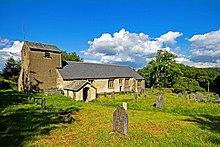St Anthony's Church, Cartmel Fell
| St Anthony's Church, Cartmel Fell | |
|---|---|
 St Anthony's Church, Cartmel Fell, from the southwest | |
| 54°17′06″N 2°53′52″W / 54.2849°N 2.8977°W | |
| OS grid reference | SD 417 881 |
| Location | Cartmel Fell, Cumbria |
| Country | England |
| Denomination | Anglican |
| Website | St Anthony, Cartmel Fell |
| History | |
| Status | Parish church |
| Architecture | |
| Functional status | Active |
| Heritage designation | Grade I |
| Designated | 25 March 1970 |
| Architectural type | Church |
| Groundbreaking | c. 1504 |
| Specifications | |
| Materials | Roughcast stone, slate roofs |
| Administration | |
| Province | York |
| Diocese | Carlisle |
| Archdeaconry | Westmorland and Furness |
| Deanery | Kendal |
| Parish | Cartmel Fell |
| Clergy | |
| Vicar(s) | Revd Michael Woodcock |
| Curate(s) | Revd Michelle Woodcock |
| Laity | |
| Reader(s) | Reg Bradby, Maureen Stevens, Tony and Hilary Fitch |
St Anthony's Church, is in the village of Cartmel Fell, Cumbria, England. It is an active Anglican parish church in the deanery of Kendal, the archdeaconry of Westmorland and Furness, and the diocese of Carlisle.[1] The church is recorded in the National Heritage List for England as a designated Grade I listed building.[2] Just to the southeast is Ravensbarrow Lodge.
History
St Anthony's was built in about 1504 as a chapel of ease to Cartmel Priory. Lateral extensions were added to the north and south at the east end of the church in about 1520.[3] The south porch was added in the 16th century, and the vestry probably in the 18th century.[2] The church was restored in 1911 by John Curwen.[3]
Architecture
Exterior
It is a long and low church standing on a hillside.[3] Constructed in roughcast stone with ashlar dressings, it has slate roofs. Its plan consists of a three-bay nave and a chancel in a single range, a south porch, north and south extensions at the east end, and a west tower with a northeast vestry. The tower has a saddleback roof, a blocked west doorway with an inserted window, and louvred bell openings. Along the south wall of the church are three-light straight-headed windows, and a priest's door with a two-light window above it. The east window in the chancel has five lights, and there are two small square windows, one above the other, to its side. There are east and west entrances to the extension on the north side.[2]
Interior
Under the tower is a baptistry containing a plain round font dated 1712. Three elaborate pews have been constructed for the church. The Cowmire Pew in the northeast of the church was probably created from a reredos and chancel screen in 1521. It was restored in 1911.[2] It has possibly been used as a schoolroom, as there are inscribed calculation aids on a bench.[3] To the east of this is a smaller pew dated 1696. In the southeast of the church is the Burblethwaite Pew, made in the 17th century, and reconstructed in 1810. Opposite is a three-decker pulpit dated 1698 with a tester. Also in the nave are Royal arms of 1781. In the chancel is an 18th-century three-sided communion rail. On the walls of the chancel are boards painted with the Lord's Prayer, the Creed, and the Ten Commandments.[2] The east window contains stained glass dating from about 1520; this was restored in 1911. It contains depictions of St Anthony, St Leonard, the Crucifixion, and the Seven Sacraments. There are also fragments of 16th-century glass in a north window.[3]
External features
In the churchyard is a rectangular stone block with a rounded end and three steps. This is thought to have been the base of a sundial, or possibly a mounting block, and is listed at Grade II.[4]
See also
- Grade I listed churches in Cumbria
- Grade I listed buildings in Cumbria
- Listed buildings in Cartmel Fell
References
- ^ St Anthony, Cartmel Fell, Church of England, retrieved 27 June 2012
- ^ a b c d e Historic England, "Church of St Anthony, Cartmel Fell (1224955)", National Heritage List for England, retrieved 27 June 2012
- ^ a b c d e Hyde, Matthew; Pevsner, Nikolaus (2010) [1967], Cumbria, The Buildings of England, New Haven and London: Yale University Press, pp. 273–274, ISBN 978-0-300-12663-1
- ^ Historic England, "Base of sundial approximately 15 metres to south east of St Anthony's Church, Cartmel Fell (1224956)", National Heritage List for England, retrieved 27 June 2012

